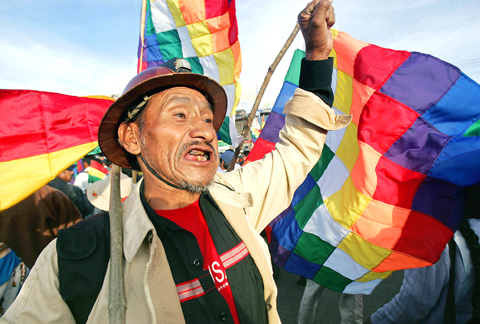The Organization of American States (OAS) late on Friday expressed support for Bolivia’s territorial integrity ahead of an autonomy referendum
In a resolution, the OAS Permanent Council rejected “any attempts to disrupt” Bolivia’s constitutional order and its territorial integrity. It also urged all those involved in the political process “to avoid any action that could undermine peace, constitutional order and peaceful coexistence among Bolivians.”
Bolivia is bracing for a weekend vote on autonomy in the province of Santa Cruz that many fear could send the Latin American nation into violent turmoil.

PHOTO : AFP
Local authorities in Santa Cruz, which counts as the wealthiest of Bolivia’s nine provinces because of its gas riches, are expected to win overwhelming backing in the referendum.
If it is passed, they plan to implement statutes giving them greater control over the region’s finances and the right to create their own security force.
But leftwing Bolivian President Evo Morales has vowed to ignore such a result, calling it unconstitutional and separatist.
Although he has backed away from an early threat to send in troops, the specter of street violence between his supporters and backers of Santa Cruz autonomy looms large.
On Friday, 5,000 indigenous Indians held a march through Santa Cruz, the main city of the province with the same name, to protest against the regional referendum seeking greater independence from the national government.
Recent polls suggest as much as 70 percent of the province’s 900,000 voters will back the move to autonomy.
OAS Secretary General Jose Miguel Insulza said members of the organization were “fundamentally preoccupied” with the course of events in Bolivia.
“We want to preserve national unity in the country, its democracy and avoid violence,” Insulza told reporters ahead of the vote of the resolution.
Meanwhile, Bolivian Foreign Minister David Choquehuanca decried what he described as a refusal by Santa Cruz leaders to maintain dialogue with the central government.
“We thought they would listen to appeals by the OAS, the Catholic Church and the international community,” he said. “But that was not the case.”
Morales, the country’s first indigenous president and an admirer of Venezuela’s leftist President Hugo Chavez, has embarked on a socialist agenda that has raised hackles in Santa Cruz and other areas with big landowners.
With a defiant tone, he sent police and soldiers this week to Santa Cruz to seize the offices of a telecommunications company, Entel, a subsidiary of Telecom Italia, that he nationalized by decree.
Four energy firms operating in Bolivia were also declared to be under the control of the state.
Today’s referendum is mostly a reaction to Morales’ determined push to revise the constitution to give more power and wealth to the indigenous population.
The measures include limiting the size of land in private hands and distributing more money from Bolivia’s vast gas fields.
Morales’s tactic of railroading through the proposed amendments, and his refusal to negotiate, has fueled much of the resentment that gave rise to the autonomy campaign in Santa Cruz and elsewhere.
Three other neighboring provinces are to hold their own autonomy votes next month, and two others are thinking of following suit.

In the sweltering streets of Jakarta, buskers carry towering, hollow puppets and pass around a bucket for donations. Now, they fear becoming outlaws. City authorities said they would crack down on use of the sacred ondel-ondel puppets, which can stand as tall as a truck, and they are drafting legislation to remove what they view as a street nuisance. Performances featuring the puppets — originally used by Jakarta’s Betawi people to ward off evil spirits — would be allowed only at set events. The ban could leave many ondel-ondel buskers in Jakarta jobless. “I am confused and anxious. I fear getting raided or even

Kemal Ozdemir looked up at the bare peaks of Mount Cilo in Turkey’s Kurdish majority southeast. “There were glaciers 10 years ago,” he recalled under a cloudless sky. A mountain guide for 15 years, Ozdemir then turned toward the torrent carrying dozens of blocks of ice below a slope covered with grass and rocks — a sign of glacier loss being exacerbated by global warming. “You can see that there are quite a few pieces of glacier in the water right now ... the reason why the waterfalls flow lushly actually shows us how fast the ice is melting,” he said.

Eleven people, including a former minister, were arrested in Serbia on Friday over a train station disaster in which 16 people died. The concrete canopy of the newly renovated station in the northern city of Novi Sad collapsed on Nov. 1, 2024 in a disaster widely blamed on corruption and poor oversight. It sparked a wave of student-led protests and led to the resignation of then-Serbian prime minister Milos Vucevic and the fall of his government. The public prosecutor’s office in Novi Sad opened an investigation into the accident and deaths. In February, the public prosecutor’s office for organized crime opened another probe into

RISING RACISM: A Japanese group called on China to assure safety in the country, while the Chinese embassy in Tokyo urged action against a ‘surge in xenophobia’ A Japanese woman living in China was attacked and injured by a man in a subway station in Suzhou, China, Japanese media said, hours after two Chinese men were seriously injured in violence in Tokyo. The attacks on Thursday raised concern about xenophobic sentiment in China and Japan that have been blamed for assaults in both countries. It was the third attack involving Japanese living in China since last year. In the two previous cases in China, Chinese authorities have insisted they were isolated incidents. Japanese broadcaster NHK did not identify the woman injured in Suzhou by name, but, citing the Japanese